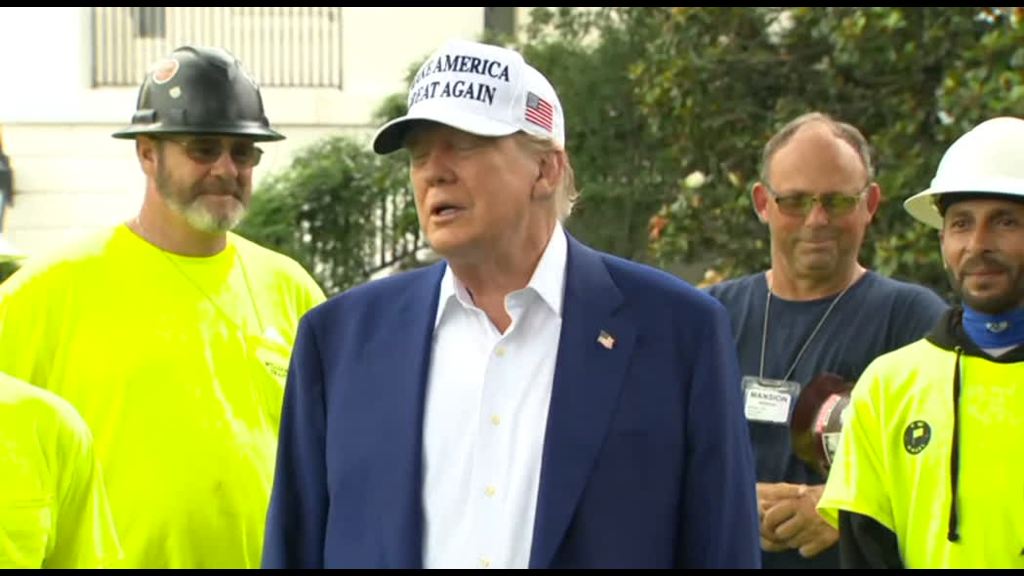Iran’s Supreme Leader Ayatollah Ali Khamenei dismissed reports of an imminent collapse of the Islamic Republic, saying in a televised address on Tuesday that “Iran will never surrender” despite six consecutive days of Israeli airstrikes.
Khamenei, 86, responded to a public ultimatum issued hours earlier by U.S. President Donald Trump.
“Anyone who knows Iran, its people and its history understands that this nation does not respond to threats,” Khamenei said. “Iran will never surrender. A U.S. military intervention would lead to irreparable damage.”
The statement followed a series of posts by Trump on his Truth Social account, where he warned of possible U.S. military involvement and said the U.S. knows Khamenei’s location.
“We know exactly where he’s hiding,” Trump wrote. “He’s an easy target, but we’re not taking him out—for now.” Trump also demanded the “UNCONDITIONAL SURRENDER” of Iran’s Revolutionary Guard.
On Wednesday, Trump was specifically asked by reporters whether the United States was prepared to go to war with Iran. “Good luck,” he said, referring to Khamenei. “The Iranians reached out, but it’s too late to talk. (…) Nobody knows what I’m going to do.”
A U.S. official familiar with internal discussions said the White House is considering joint military operations with Israel targeting Iranian nuclear facilities. The operations would likely focus on hardened underground nuclear sites and require the use of GBU-57 MOPs, or Massive Ordnance Penetrators.
Israeli airstrikes overnight between Tuesday and Wednesday hit about 20 targets in the Tehran area, according to the Israeli Defense Forces. The IDF said the strikes hit missile production plants, aerospace sites, the Tehran Nuclear Research Center, centrifuge facilities in Karaj, a university affiliated with the Revolutionary Guard, and the Khojir missile site.
Iran has fired more than 400 missiles at Israeli targets over the past week. Israeli officials said roughly 40 of them — most identified as Fattah-1 hypersonic missiles — made it through the Iron Dome system and hit civilian areas.
A U.S.-based human rights group said at least 585 people have been killed in Iran, including 239 civilians. More than 1,300 have been injured. In Israel, officials reported 24 deaths from Iranian missile strikes.
Israeli operations have targeted senior Iranian officials. Iran’s military chief of staff, Mohammad Hossein Bagheri, and Revolutionary Guard commander Hossein Salami were among those confirmed killed. General Ali Shadmani, who had recently replaced Gholam Ali Rashid, was also killed, according to Iranian state media.
Other senior officials killed include joint command chief Gholamali Rashid, aerospace commander Ali Hajizadeh, and Revolutionary Guard intelligence head Mohammad Kazemi.
Israeli sources said at least 14 nuclear scientists were also killed, including Fereydoun Abbasi, the former head of Iran’s Atomic Energy Organization and a survivor of a 2010 assassination attempt.
Tehran residents have begun fleeing the capital. Long lines of vehicles were reported on roads leading to Lavasan, a suburb northeast of the city. “We’re staying here until the war ends,” a woman identified as Arezou, 31, told Reuters by phone. “A missile hit my friend’s house. Her brother was injured. We’re civilians. We don’t understand why we’re being punished.”
In Tehran, officials moved to limit coverage of the attacks. Journalists were told to stop filming bomb damage, and state broadcaster IRIB pulled footage of destroyed buildings off the air. Internet access has been heavily restricted. Fuel is also being rationed. Oil Minister Mohsen Paknejad, speaking on state TV, called it “a precautionary measure.”
Russia’s Foreign Ministry said the situation is “millimeters from catastrophe.” Spokeswoman Maria Zakharova warned that Israeli strikes on Iranian nuclear sites could trigger a disaster comparable to Fukushima. Chinese President Xi Jinping said the United States is “pouring fuel on the fire,” according to remarks published on Tuesday by Xinhua news agency.
On the same day, European Union foreign policy chief Kaja Kallas called the situation “extremely dangerous” and reiterated that Iran “must never obtain nuclear weapons”.
Jordan’s King Abdullah II, in a speech to the European Parliament, said Israel’s strikes on Iran could ignite wider unrest across the Middle East and beyond. Turkey’s President Recep Tayyip Erdoğa, meanwhile, told lawmakers in Ankara that Iran had a right to defend itself and described the strikes as “a natural, legitimate and lawful reaction to Israel’s brutality and state terrorism.”












